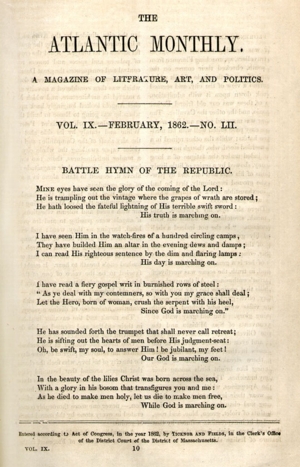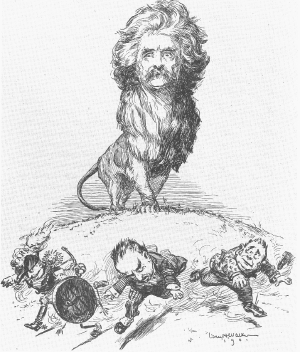
Images of Liberty and Power
[Updated June 12, 2011]
9. Patriotic
Songs which invoke God ("God is on our side") [January 15, 2011] |
|
 |
 |
The publication in the Atlantic Monthly of
Julia Ward Howe's "Battle Hymn of the Republic" (1862) |
A cartoon in Life, Feb. 1901 of
Mark Twain as "The American Lion of St. Marks" scattering
the American imperialists. In the same month MT wrote an "updated" version
of the "Battle Hymn of the
Republic" to take into account the American war in the Philippines. (1901) |
Mine eyes have seen the glory of the coming of the Lord: I have seen Him in the watch-fires of a hundred circling camps, I have read a fiery gospel writ in burnished rows of steel: He has sounded forth the trumpet that shall never call retreat; In the beauty of the lilies Christ was born across the sea, He is coming like the glory of the morning on the wave, |
Mine eyes have seen the glory of the launching of the Sword; I have seen him in the watch-fires of a hundred circling camps; I have read his bandit gospel writ in burnished rows of steel: We have legalized the strumpet and are guarding her retreat;* In a sordid slime harmonious Greed was born in yonder ditch, * NOTE: In Manila the Government has placed a certain industry under the protection of our flag. (M.T.) |
Observations on patriotic songs which assert that "god is on our side": It is a truism that all countries claim that they are God's chosen people, that they alone have been especially blessed with his favour; that their leaders have special access to God and therefore know his will; and that all those who fight in their country's cause do so knowing that justice and goodness are on their side. An obvious contradiction occurs when both sides to a conflict assert the same thing. Either one or both of them have to be wrong. A particularly glaring example of this occured during the American Civil War when the Union forces went so far as to put the slogan that "In God We Trust" on their coinage and individuals like Howe wrote appalling lyrics like the "Battle Hymn of the Republic" which was quickly adopted by the Union soldiers and is still sung with gusto by Americans today. The sad thing is that the tune was taken from an admirable abolitionist song, "John Brown's Body", and used for other less noble purposes. The Confederate forces did likewise by using the phrase "Deo invice" (With God as our champion) on their great seal - also done in 1862. In 1901 Mark Twain had become increasingly critical of the American invasion of the Philippines (a Catholic nation under the Spanish). What had been touted as a "war of liberation" of the Philippine people had turned quickly into a standard European-style conquest of a would-be colony with Protestant American boys killing Catholic Philippino resistance fighters leaving hundreds of thousands dead. So he felt it was time to update Howe's patriotic song with some new lyrics better suited to the new century. Note his condemnation of the Americans as "faithless son(s) of Freedom" and that he retains some of the original, namely the refrain "Our god is marching on" (admittedly in lower not upper case this time around). Twain's reworking of the hymn should be compared to his equally devastating "The War Prayer" (1905) in which he shows that the opposite side of the coin to praying to God for swift and glorious victory for one side is the eqaully swift though inglorious death and suffering of the defeated enemy. Praying for victory for oneself implies praying for the death and suffering for others - but this is never mentioned in polite company. In our own tme we have Bob Dylan's classic anti-war song "With God on Our Side" (from the album The Times They Are A-Changing (1963)). Here are three verses relevant to the topic here, namely the American Civil War and the war in the Philippines [complete lyrics here]: Oh my name it is nothin' Oh the Spanish-American So now as I'm leavin' |
|